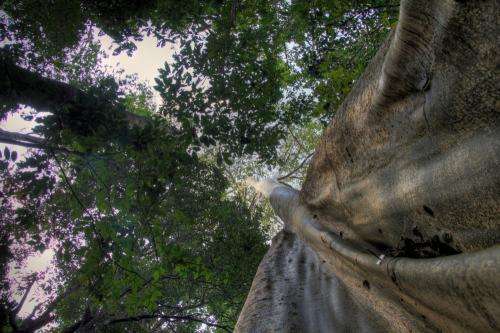Increase in CO2 has not stimulated growth of tropical trees

Since the start of the industrial revolution in 1850, atmospheric CO2 levels have increased by about 40%. However, contrary to expectations, the growth of tropical trees has not increased as a result. The prediction that tropical forests would help to slow down climate change therefore appears to be too optimistic, according to research performed at Wageningen University and published in the scientific journal Nature Geoscience.
'Experiments have shown us that CO2 can boost the growth of trees due to changes in the leaves,' said the lead author Peter van der Sleen from the chair group Forest Ecology and Forest Management. 'To measure such changes in tropical rainforests we analysed stable carbon isotopes present in the wood of trees growing in Bolivia, Cameroon and Thailand. The relative amounts of various carbon isotopes can indicate the degree of water stress. We found that, on average, the trees had less water stress than 50, 100 or 150 years ago. The big question was whether this improved water supply had also resulted in increased tree growth.'
With the aid of annual rings, it is possible to investigate the whole period throughout which CO2 levels in the atmosphere have been increasing. Studies are uncovering more and more tropical tree species that have annual rings: a wonderful source of information on the growth, physiology and environment of trees. 'We are gradually making that information source available,' the co-author and research leader Pieter Zuidema explained. The analysis of annual rings in the wood of trees under investigation leaves little room for doubt. 'None of the forests investigated have provided us with evidence of increased tree growth over the last 150 years. That is remarkable because it has always been assumed that trees grow more rapidly when there is more CO2 in the atmosphere.'
Cover Story Nature Geoscience
Nature Geoscience has chosen to make this research the cover story for the January issue, which proves how remarkable the results are. Peter van der Sleen: 'Our results are important for the IPCC predictions, which underpin international climate policy. Almost all models made so far assume that CO2 stimulates tree growth in the tropics. In this way, tropical forests can function as carbon sinks. They intercept, as it were, a part of the extra CO2. Our study demonstrates that this assumption is probably too optimistic'. Pieter Zuidema added the following: 'But that does not mean to say that tropical forests have suddenly become less important for the worldwide carbon cycle. These forests contain enormous quantities of carbon, and deforestation results in huge amounts of CO2 emission. Our study merely shows that increased CO2 did not lead to the expected extra growth in existing forests.'
-

Cameroon (Korup National Park) Terminalia ivorensis. Credit: Peter Groenendijk -

The Amazone © Peter van der Sleen
Journal information: Nature Geoscience
Provided by Wageningen University





















